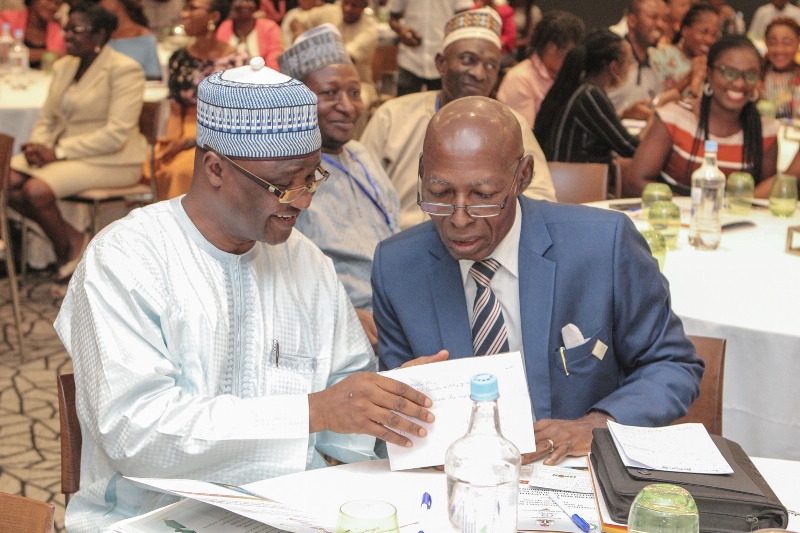At a 2-day roundtable on the use of Nigerian software in the financial/banking services sector in Lagos, stakeholders were unanimous in their judgment that indigenous software development and adoption are key to Nigeria’s economy. ITPulse’s Martin Ekpeke was there to capture the moments.
The Nigerian home-grown software industry is shrinking and will ultimately die, except the players, including the regulators urgently come to the rescue by identifying companies with high demand for software solutions developed in Nigeria, and provide a platform for linking local software suppliers to end-users as an avenue to create and generate employment, income and wealth in Nigeria.
Just like every other item, the average Nigerian enterprise, especially the banking industry has an insatiable taste for foreign software, consuming 55-60 percent of foreign technologies. Thus, remitting huge funds to Original Equipment Manufacturers (OEMs) on a steady basis.

Sadly, these huge sums of funds are remitted out of the country without the foreign ICT owners assisting local partners to develop its knowledge base, capabilities
This is bad business for the country’s economy and should worry any government. The cost of patronising foreign software is enormous, with minimal contribution towards reducing the unemployment level in the country.
But some industry stakeholders, including government agencies seem to be alarmed. Thus, a 2-day stakeholders roundtable on the use of the Nigerian software in the financial/banking services sector was called in Lagos, South-West Nigeria.

The request for the roundtable was jointly agreed and
For CWG, Nigeria’s largest system integration company, which initiated and spearheaded the idea of the roundtable, the objective is to promote awareness for the development and utilization of Local Technology Solutions in various sectors of the Nigerian economy.
According to the company, the local software industry is doing well, with young creative minds developing products that have rejigged the financial industry. “No doubt, the indigenous software is doing well, but lack patronage. Thanks to young and keen minds that are developing products that have continually redefined the Financial Technology Space (FinTech),” said Adewale Adeyipo, CWG’s Acting, Group Chief Executive Officer.
Adeyipo, who was represented by Mr. Udukheli Izebuno, Business Director, Government Sector at CWG Plc, noted that the growth of Nigeria’s FinTech market has been in no small part due to the willingness of financial institutions to become a fodder for these adventurists to step up and spin brilliant ideas that have shaped how Nigerians pay for services and conduct transactions.
He said the innovative prowess of these Nigerians has been acknowledged with about N38 billion of local and foreign investments that went into Nigerian start-ups in the 2nd and 3rd quarter of 2018, 75percent went into Nigerian FinTech. This growth, Izebuno believes underscores the upward trajectory of ICT as a significant contributor to Nigeria’s GDP, currently at about 11.81 % of GDP as at Q3, 2018.
Commercial banks in Nigeria every year spend in excess of $400 Million USD on software renewals and upgrades for international software solutions. This spending has been the norm since its inception.
This, CWG argues, is worrisome and have started using its expertise and leveraging on the local content policy to join in designing Core Banking Applications, which have been deployed to over 800 MFBs nationwide from 12 local manufacturers.
“With over 900 MFBs and 2,972 Cooperatives in Nigeria, the adoption of local software’s for example, as their core banking application can create over $100M in revenue yearly through deployment, renewals, and maintenance. If more policies exist and are active, more revenue can be generated to promote indigenous software development and implementation,” Izebuno stated.

He added that CWG is consistently developing indigenous software to tackle and meet the need of every Nigerian ranging from the lower class to the upper-class segment, explaining that it has become an objective through the “CWG 2.0” Initiative to develop solutions that enable growth, improve the standards of living and do so at reduced costs.
There are endless opportunities for a vibrant software industry in Nigeria, especially with its average population of over 190 million people with about 50percent of the population(94.8M) to be an active internet user.
All that is needed is capacity building. CWG is also doing that by investing in skill acquisition programs through CWG Academy platform, D-Coder initiatives for Secondary School Students during long vacations, so young Nigerians can shape their IT career and consistently seek for disruptive solutions that can compete with “foreign” software.
The Nigerian software ecosystem can improve on their contribution to the GDP and change the narrative from being dependent on international solutions.
But this must start from the government, which is the biggest consumer of any product. The government has to play a significant role in the development and patronage of indigenous software with instruments such as the local content policy.
For the National Office for Technology Acquisition and Promotion (NOTAP), indigenous IT companies must engage themselves in research & development as a form of investment to keep standards with developed nations and to gain more market share in the software ecosystem and further contribute to the economy’s GDP.
Giving a remark at the event, the Director General of NOTAP, Dr. DanAzumi Mohammed Ibrahim disclosed that as part of efforts to get Nigerians to patronize indigenous solution for National development, NOTAP in collaboration with the World Intellectual Property (WIPO), Central Bank of Nigeria and other stakeholders resolved and developed the Local Vendor Policy in 2007 to strategically engage local ICT firms on the implementation of foreign software agreements in Nigeria.
He said the policy, which came into effect in 2008 states that the Annual Technical Support (ATS) fee should not be made more than 23 percent of the Software License fee, the payment of Annual Technical Support (ATS) should commence one year after the implementation of the Software license agreement.
A local vendor must be appointed to be involved in the implementation of a Software License agreement submitted to the Office and must be paid a minimum of 40% of the ATS fee in Naira, and in the event of renewing the agreement after one year, evidence of payment of 40 percent ATS fee must also be submitted to NOTAP.
Asked whether this policy has been implemented, the NOTAP DG said: “It may interest you to know that about ten (10) indigenous ICT Firms are currently participating in the implementation of foreign technology transfer agreements and some have developed competencies and capacities to be listed on the Nigerians Stock Exchange (NSE).”

Praising CWG for developing capacity and putting a lot of infrastructure in place, Dr. DanAzumi Mohammed Ibrahim urged Nigerians not to be under any illusion that foreign firms are here for the development of our country.
“Nigeria needs to be strategic to leverage on the available foreign technologies to ensure inclusive and sustainable growth of our country,” DanAzumi advised.
To complement the efforts toward having Nigerian software patronise by Nigerians, Government through the Nigerian Information Technology Development Agency (NITDA) has identified the need for concerted action and policy to utilize the significant spend of Government to promote local content as a core pillar of economic diversification and for building targeted industries in Nigeria.
The government did this by issuing the Guidelines for Nigerian Content Development in ICT, essentially mandating Agencies of Government to compulsorily prioritize indigenous ICTs for procurement where available in-country.
The regulation mandates a compulsory consideration of indigenous hardware, software, networking service, ICT services and data management first before any non-Nigerian service provider.
According to NITDA, this policy has resulted in growth of the purchase of indigenous content in the public sector, where last year recorded the highest figures of purchase of indigenously-assembled hardware and software with a total of 355,647 units sold, compared to 154,424 from the previous year.
“Implementation of this policy has also ensured that 95 percent of the Federal Government’s data is hosted locally. With the issuance of the Presidential Executive Orders 003 and 005, the Nigerian Content Guidelines of NITDA received a significant boost and has strengthened the arm of the Agency in implementing these Guidelines,” said Chris Okeke, who represented the DG of NITDA.
Banking sector in Nigeria must find a way to support the maturation of indigenous software and put a lid on the haemorrhage of resources while Nigeria speedily develops its own capabilities.




